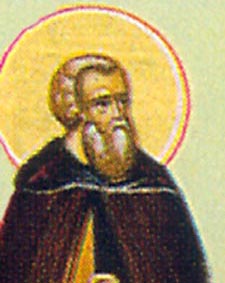|
|||
|---|---|---|---|
| This weekly bulletin insert complements the curriculum published by the Department of Christian Education of the Orthodox Church in America. This and many other Christian Education resources are available at http://dce.oca.org. | |||

Saint Marcian the Hermit and Confessor of Cyrus (or Cyrrhus) in Syria lived in the fourth century. As the child of a wealthy father who held several important government posts, Marcian lived the sumptuous life of the royal court from his earliest years. This gave him the benefit of an excellent education, but it also impressed on him the shallowness of court life. It seemed to Marcian that the more worldly possessions and successes people had, the unhappier they were. Why else would those in high positions constantly be seeking some novel pastime to fill their days? Why else would so many seem almost desperate in their quest for some kind of contentment? Marcian didn't want a life full of ceremony and constant interaction with other people. What he did want was to be alone with God, and so he decided to "forget and be forgotten by" the world. Telling none of his friends, he left his old life behind and went to a secluded part of the Syrian desert, near the border of Arabia. There he built a small, narrow cell to live in. We often read of desert monks who fasted for days at a time. Marcian chose a different way. He ate just enough every day to be sure he would have strength to carry on his simple life of prayer, reading, singing psalms and making small items to trade for bread. Marcian's strongest desire was always to live with only God for company, but his life changed after some years of solitude. His holiness had become known, and two disciples approached him and begged to join him. Marcian, giving up his own preference, humbly accepted them, though he continued to live alone in his cell. The two disciples, Eusebius and Agapetus, built a cell near his. They sang psalms with him, and gratefully listened to his answers to their spiritual questions. They said later that even when reading at night, Marcian never had to use a candle. There was a supernatural light providing illumination of his cell, just as his prayerful communication with God illuminated his soul. Growing numbers of men wanted to become Marcian's disciples. He was finally persuaded to let a monastery be built near his cell, and appointed Eusebius abbot. Monks could then come to speak with him. But when some Syrian bishops suggested he be ordained a priest, he was so distressed, protesting his unworthiness, that they abandoned the idea. As Marcian's life neared its end, his distress increased. His reputation for miracle-working holiness had encouraged some people to build chapels near his cell, hoping to be given his body to bury in them when he died. Fearing such "fame," he ordered his disciples to bury him secretly in a remote place. Marcian didn't see fame as a measure of success. He was so close to Christ that he could say, in words we read in Galatians, that "it is no longer I who live, but Christ who lives in me" (Galatians 2: 20a). |
|||
